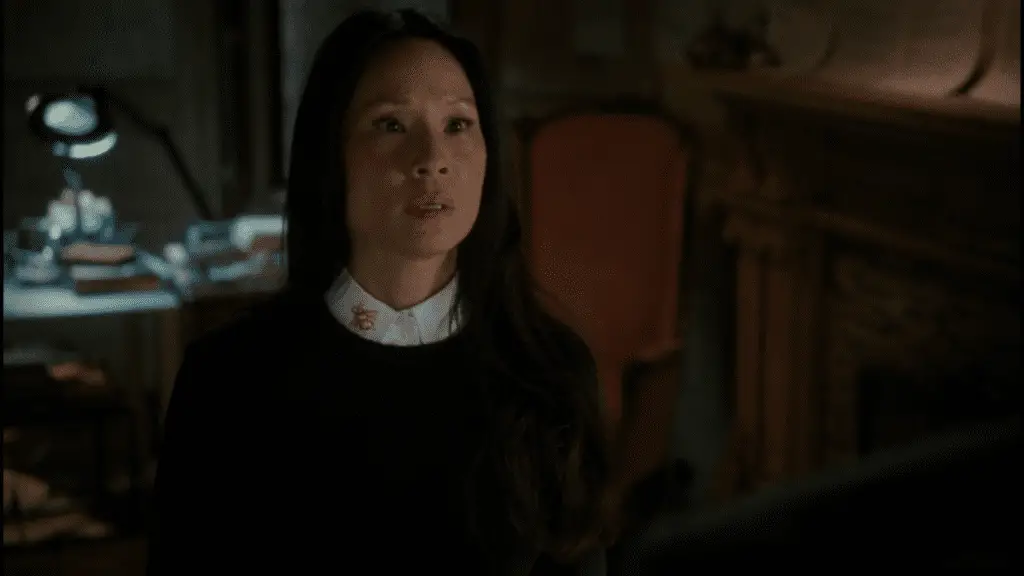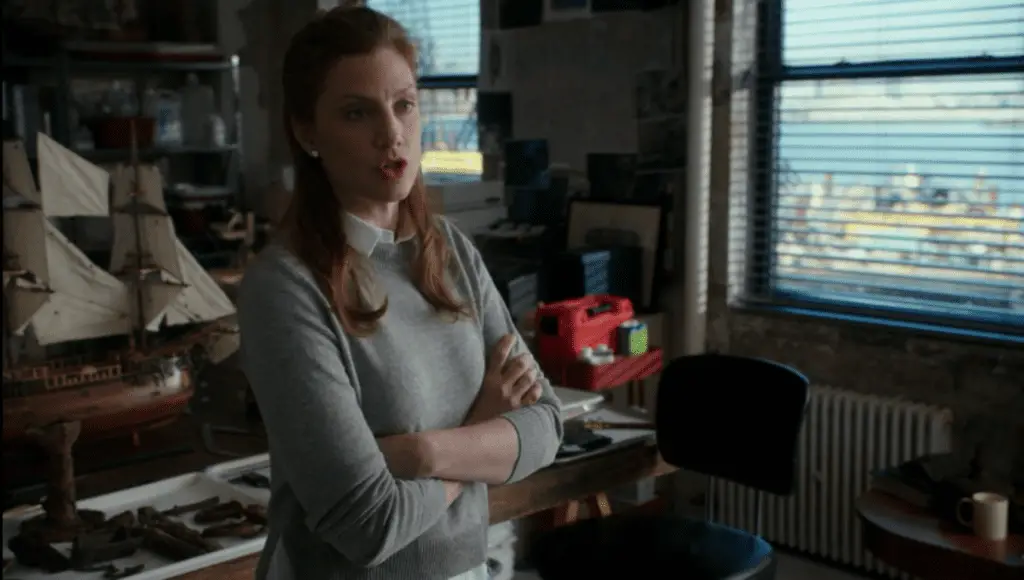This week on Elementary, I accidentally watched fifteen minutes of Madame Secretary before I realized I was not watching the right show. I just sat there, wondering who all these people were, waiting for someone to get murdered. And in my defense, someone did get murdered. Only when Sherlock then failed to show up did I realize I was watching the wrong show. But I’m glad I figured it out, because this episode of Elementary was, in my opinion, one of the best of the season.
The correct episode picked up shortly after the events of last week. Sherlock explains his new theory to Joan: twelve years prior, Shinwell murdered his friend Jameel Clark in cold blood for unknown reasons. But Joan isn’t as convinced as Sherlock. After all, their only source for that theory is Jameel’s younger brother, Damon, who claims now to be a witness but denied knowing anything twelve years ago.
Elsewhere in the city, an abandoned storage unit is up for auction. In real life, a storage unit like this would probably hold some old clothes and books. Because this is a murder mystery, it naturally contains a dessicated corpse.
The detectives show up to investigate the scene. The corpse turns out to be the dead owner of the storage unit who stopped paying his rent several months ago, probably because of the whole being dead thing. Unfortunately, he was using a false ID, so he’s currently unidentified. He has a stab wound that goes through and through, as if he was stabbed with a sword, which hints that their killer must be a physically strong individual.
The storage unit itself turns out to be no ordinary unit. Nearly everything it contains is expensive, a fortune of small treasures. Considering the private nature of the storage facility, Sherlock thinks they’re most likely stolen. Many items are labeled with the names of the individuals to which they once belonged. Brief googling reveals these individuals are all recently deceased of natural causes and without an heir. Fun fact: when someone dies without a will, the city’s public administrator office takes possession of their estate and attempts to find heirs. If no heir is found, the estate is sold and the proceeds given to the city. Sherlock and co. conclude that their dead John Doe must have worked in the P.A. office.

This leads them to an identity, Travis Unger, and to Unger’s former partner in duty…but not crime. He denies being involved in Unger’s thievery, and a solid alibi for Unger’s time of death proves that he didn’t kill Unger either. But he does have one interesting piece of information. Shortly before Unger’s death, he’d told his coworker that he’d stumbled onto something that was going to make him rich.
Sherlock and Bell go to the P.A. office’s warehouse to examine the possessions of the last case that Unger worked on. The belongings are mainly insignificant, but one item stands out: a beautiful old sea chest of the kind that sailors used to store belongings in the 1700s. From the quality of the chest, Sherlock guesses that it belonged to a ship captain. An item in the chest gives them a name, Edmund Barker.
But there’s something missing. Based on the smell inside the chest, Sherlock can tell it recently contained an old book, but there’s no book to be seen. I admit it seems cheesy that Sherlock can sniff out a clue like that, but can you deny that old books smell amazing? Based on the fact that Barker was apparently a ship captain, Sherlock thinks the missing item must be a captain’s log.
Joan, meanwhile, is with Damon Clark and Detective Guzman, the police officer working with Shinwell on taking down SBK. Damon is telling the detective the story of the night his brother was murdered. Joan is obviously skeptical as she listens, but Damon’s story is detailed and emotional and has the ring of truth. It certainly doesn’t make Shinwell look good.
Back at the brownstone, she reluctantly admits to Sherlock that his theory seems to be right. But she doubts that Guzman will prosecute a case against Shinwell; the evidence is too thin and Shinwell too valuable an informant. When she asks what they should do next, Sherlock says they should wait and focus on their current case, which is just getting exciting.
As it turns out, all of Captain Edmund Barker’s log books seem to be accounted for, and don’t contain record of anything exciting. But on closer examination, Sherlock realized that certain stretches of time are falsified by Barker himself. Coincidentally, historical record indicates that in those same stretches of time, a pirate called Black Peter was active. But pirates have to keep log books too, so if Barker was secretly Black Peter, he would have needed two sets of logs. That must be what Unger discovered. After all, if anything is worth murdering over, wouldn’t it be a pirate’s treasure?

I consider myself somewhat of a connoisseur of murder mystery television shows. I have watched probably more than my fair share in my life. “Secret treasure” is, by now, a familiar trope. It’s also an awesome trope. What kind of a cold heart does a person have to have to not get excited by pirates and treasure? I swear that you could tell even Sherlock and Joan were a little excited. Even better, this episode handled it well. I think that certain shows take hidden treasure plot lines as an excuse to get a little silly and illogical. But in this episode, the writers give us the very fun and exciting premise of treasure, and then proceeded to get real logical with it. Everything in this episode was dramatic and twisty, but made you think, “That could probably happen, right?”
After all, as Gregson points out, if treasure was buried somewhere in New York City, someone would have found it by now. There’s no big X on the streets of Manhattan somewhere. Instead, the treasure is on a sunk ship, a Spanish vessel called the Santa Leticia that, according to Black Peter, had a cargo of gold doubloons. That could happen, right?
Joan, Sherlock, and Bell set out to trace Unger’s footsteps. It’s not easy to salvage a sunken ship, so Unger attempted to strike a deal with a treasure hunter with the fitting name of Lars Vestergaard. But Vestergaard tells the detectives that he turned down Unger’s offer. As it turns out, Vestergaard already knew of the Santa Leticia and had registered a salvage claim on her. He didn’t need Unger to reveal the location to him.
But when Vestergaard reached the Santa Leticia, sometime after Unger was killed, he found that the vessel was already picked clean. Someone had made it there before him. It stands to reason that someone else got their hands on the pirate’s logbook, and most likely that individual is the killer.
As Joan and Bell follow up on that, Sherlock decides that he’s done waiting on Shinwell’s case and goes to confront him alone. He tries to persuade Shinwell to confess to his crimes, but Shinwell, visibly angry, denies it all.
Satellite photos of the location of where the Santa Leticia sank reveals that a ship had been anchored in that location before Vestergaard could get there. Tracking this ship down leads them to the handsome and very rich Mr. Al-Asmari. He cheerfully admits to salvaging the ship and to having Black Peter’s logbook. Joan and the captain are amusingly shocked at having a murder suspect so happily cooperate. It becomes clear that Al-Asmari has no idea that he’s involved in a murder case. He insists he never met Unger, and that an anonymous source on the internet sold him the log book for a fraction of what the treasure on the Santa Leticia was worth. All he knows is a username, Kashgar.

This episode somehow came into my home and read my dreams to see the things that I would most want to be in this episode, and thus at this point Mason makes a reappearance. He’s in university now. I’m proud of him.
With Mason’s help, they track down Kashgar to an IP address belonging to a career criminal. But when they go to arrest the man, he’s never heard the name Kashgar. But someone else has…his 14 year old daughter, who reluctantly confesses that she’s Kashgar. Once again, I love this episode.
A petite fourteen year old girl obviously didn’t run a grown man through with a sword. In fact, she says she was never in possession of the log book herself. She helps people on the internet anonymously buy and sell antiques, but she never holds the objects herself. She recently helped an unknown client sell the log book directly to Al-Asmari. Strangely enough, the client let her keep all the profits from the sale for herself.
The detectives at this point are decidedly puzzled. The mysterious client that sold the log book doesn’t seem to profit from this in any way; Al-Asmari got the treasure and “Kashgar” received the proceeds. Why would anyone do that?
Sherlock considers the problem from a different angle. No one profits, so who is hurt by this behavior? The obvious answer is Vestergaard, who was unable to salvage the ship. They decide to investigate Vestergaard’s enemies.
This leads them to a strange group of modern “pirates.” A group flying a pirate flag, but with crossed scuba tubes rather than crossbones, has been attacking and vandalizing local salvagers, including Vestergaard.
As Sherlock waits for information on who ordered this unique custom flag, Joan discovers his private confrontation with Shinwell. She’s not exactly happy. The conversation that follows is a fascinating examination of the two’s personal ethics.

Joan doesn’t understand how Sherlock can try to convince Shinwell to turn himself in when that would undermine the efforts to take SBK down. She agrees, of course, that what Shinwell did was wrong, but she argues that he’s the lesser of two evils and that letting Shinwell go free is worth taking down SBK.
Sherlock, on the other hand, can’t accept letting Shinwell go free for a murder he committed. He points out that if/when SBK is successfully taken down, Shinwell will probably be placed in witness protection and they’ll never see him again. He’ll get away with murdering Jameel Clark scot free.
These were not necessarily the stances I would have expected the two to take, and yet I found it both believable and an interesting revelation of how they each think. Sherlock is obviously willing to bend and break the law. He frequently breaks and enters, he’s both destroyed and fabricated evidence, and he is, after all, a recovering drug addict. There have also been episodes where he has willingly let murderers go. But in those cases, there were mitigating circumstances, such as the murderer being underage and the victim being a truly horrible person. So it’s interesting to see that Sherlock does have a line in the sand; there are rules that he can’t break. A murderer without extreme mitigating circumstances is a murderer no matter what, and must be punished, despite the fall out. Joan, on the other hand, is usually the more law abiding of the two. Yet here we see that her own personal sense of right and wrong, and her own feelings about the sanctity of life as learned from being a surgeon, can most certainly override even laws about serious matters like murder. She can let one murder go to try and prevent dozens or even hundreds of others.
I also think it’s relevant to consider the personal stakes that both Sherlock and Joan have in Shinwell’s case. Sherlock himself points out that he destroyed evidence to keep Shinwell out of jail earlier in the season. His argument is that if Shinwell kills again, he’ll be responsible. But I think too that Sherlock compromised his morality to help Shinwell before, and he’s clearly been uneasy about it ever since. That would make it much harder for him to compromise his morality again on a much more serious case. Joan, on the other hand, is personally invested in Shinwell. She cares about him, and, perhaps more importantly, she originally interfered in his life because she was feeling a strong personal need to help someone. It would be natural to feel repelled by the idea of sending someone you care about, someone you wanted to help, to prison.
Neither of them explicitly state these feelings in this conversation, yet I felt that this undercurrent of their personal emotions was present in the entire scene. The writers did an excellent job in this scene of subtly pulling together several strings of emotional plotline that have been built up over this season.
Before the two can reach a resolution on what to do about Shinwell, the flag lead pays off. It was purchased by a marine archaeologist and her students. The professor hates salvagers like Vestergaard for destroying important historical sites. She and her students were vandalizing them to try and slow them down.

Al-Asmari, on the other hand, preserves the treasures that he finds, and has allowed the professor in question to look at his collection before. Thus, the detectives theorize that Unger came to her after Vestergaard turned him down, but she was unable to get the funding together to reach the site before Vestergaard. In order to sabotage him and preserve the site, she killed Unger, stole the book, and arranged for Al-Asmari to receive it.
But the professor not only denies all this, but insists that Vestergaard would have had no reason to salvage the Santa Leticia in the first place. None of the historical documents that exist about the Santa Leticia say it had treasure on board. Black Peter’s log book is the only book with that claim, and that book showed up after Vestergaard began funding his trip to salvage the Santa Leticia. As she speaks, Sherlock clearly gets an Idea.
As always, I’ll refrain from spoiling whodunit and whytheydunit, but here’s a hint: it involves The Producers. Also, I love that Sherlock is apparently a Gene Wilder fan. Do you think he’s seen Young Frankenstein?
Case successfully solved, Sherlock is walking home alone at night when he’s suddenly brutally attacked. By Shinwell. Enraged, Shinwell at last admits to having killed Jameel, and reveals his reason why. SBK made a deal with a rival gang, but the rival gang demanded Jameel be killed due to a romantic entanglement. But that wasn’t what they told Shinwell; they told him that Jameel was a traitor to the gang and had to be taken out. So now, Shinwell will do anything to take them down, and he won’t let anyone get in his way, including Sherlock. Or Sherlock’s kidneys, judging from how hard Shinwell was kicking.

